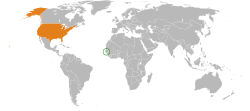 | |
Gambia |
United States |
|---|---|
| This article includes a list of references, related reading, or external links, but its sources remain unclear because it lacks inline citations. Please help improve this article by introducing more precise citations. (February 2016) (Learn how and when to remove this message) |
Gambian–American relations are bilateral relations between the Republic of The Gambia and the United States of America.
History
En route to Casablanca for a conference and then to Liberia, Franklin D. Roosevelt stopped in Banjul in 1943.
U.S. policy seeks to build improved relations with The Gambia on the basis of historical ties, mutual respect, democratic rule, human rights, and adherence to UN resolutions on counter-terrorism, conflict diamonds, and other forms of trafficking. Following The Gambia's successful presidential and legislative elections in October 2001 and January 2002, respectively, the U.S. Government determined that a democratically elected government had assumed office and thus lifted the sanctions it had imposed against The Gambia in accordance with Section 508 of the Foreign Assistance Act as a result of the 1994 coup. U.S. assistance supports democracy, human rights, girls' education, and the fight against HIV/AIDS. In addition, the Peace Corps maintains a large program with about 100 volunteers engaged in the environment, public health, and education sectors, mainly at the village level.

Relations with the U.S. have not been improved significantly due to the human rights and freedom of press shortcomings, which resulted in the suspension of The Gambia's compact with the Millennium Challenge Corporation (MCC) in June 2006. The Gambia became eligible for preferential trade benefits under the African Growth and Opportunity Act (AGOA) on January 1, 2003.
Principal U.S. officials include Ambassador Sharon L. Cromer.
The U.S. Embassy in The Gambia is located in Fajara (13°27′43.1″N 16°41′12.1″W / 13.461972°N 16.686694°W / 13.461972; -16.686694). The Peace Corps office is near the embassy.
Yundum Airport was an emergency landing site for NASA Space Shuttles.
See also
References
- "Visits of Presidents of the U.S. to the U.K." Embassy of the United States in London. Archived from the original on 2008-06-17. Retrieved 2008-10-16.
- "Space Shuttle Transoceanic Abort Landing (TAL) Sites - Banjul, The Gambia". John F. Kennedy Space Center. 2006-11-01. Archived from the original on 2011-06-10. Retrieved 2008-10-16.
![]() This article incorporates public domain material from "Background Note: The Gambia". U.S. Bilateral Relations Fact Sheets. United States Department of State.
This article incorporates public domain material from "Background Note: The Gambia". U.S. Bilateral Relations Fact Sheets. United States Department of State.
External links
| Americas |  | |
|---|---|---|
| Asia | ||
| Europe | ||
| Missions | ||
| Multilateral | ||